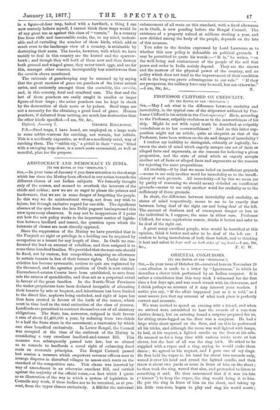ARISTOCRACY AND DEMOCRACY LN INDIA.
[TO THE EDITOR OF THE " SPECTATOR."]
Sta,—In your issue of January 6 you draw attention to the change which has since the Mutiny been effected in our action towards the different classes of our Indian subjects. We formerly thought only of the masses, and seemed to overlook the interests of the chiefs and nobles ; now we are so eager to please the princes and landowners, that we are in some danger of forgetting the people. In this way we do unintentional wrong, not from any wish to injure, but through exclusive regard for one side. The significant absence of the ryot from the late Delhi pageant hasimpressed this view upon many observers. It may not be inopportune if I point out how the new policy works in the important matter of legisla- tion between landlord and tenant, the question upon which the interests of classes are most directly opposed.
Since the suppression of the Mutiny we have provided that in the Punjaub no right or privilege in a holding can be acquired by occupation as a tenant for any length of time. In Oudh we con- fiscated the land on account of rebellion, and then assigned it to some three hundred families. We provided that the rent-rate should be fixed, not by custom, but competition, assigning an allowance to certain tenants in lieu of their former rights. Under this law eviction has become systematic, notices to quit are registered by the thousand, and the agrarian position of Oudh is now critical. Encumbered-estates Courts have been established, to save from sale the estates of spendthrifts, and thus act as a perpetual entail in favour of the great families. In the North-West Provinces the under-proprietors have been declared incapable of alienating their tenures by sale or bequest, and inheritance has been limited to the direct line, nephews being excluded, and right of lapse has thus been created in favour of the lords of the manor, which must in time lead to the total extinction of the class of yeomen. Landlords are permitted to contract themselves out of all statutory obligations. The State has, moreover, resigned in their favour a sum of about £1,400,000 a year, by reducing from two-thirds to a half the State share in the assessment, a concession by which one class benefited exclusively. In Lower Bengal, the Council was occupied at the time of the outbreak of the Mutiny in considering a very excellent landlord-and-tenant Bill. This measure was subsequently passed into law, but so altered as to concede to landlords a novel right of enhancing fixed rents on economic principles. The Bengal Council passed last session a measure which empowers revenue officers sent to arrange disputes in disturbed villages to assess such rents on the standard of the competitive rate. This clause was inserted by way of amendment in an otherwise excellent Bill, and carried against the majority of the official votes,—a fact which I quote as an illustration of the way in which a system of legislation in Councils may work, if these bodies are to be recruited, as at pre- sent, from the upper classes exclusively. A Bill for the universal enhancement of all rents on this standard, with a fixed allowance as in Oudh, is now pending before the Bengal Council. The existence of a property valued at millions sterling a year, and now divided among the body of the people, depends on the fate of this measure.
You refer to the doubts expressed by Lord Lawrence as to whether this new policy is defensible on political grounds. I may be permitted to quote his words :—" It is," he writes, " on the well-being and contentment of the people of the soil that peace and order in India mainly depend. They are the sinews and the marrow of the physical power of the country, and no policy which does not tend to the improvement of their condition will in the long-run prove advantageous to our rule." " If they are prosperous, the military force may be small, but not otherwise."






































 Previous page
Previous page